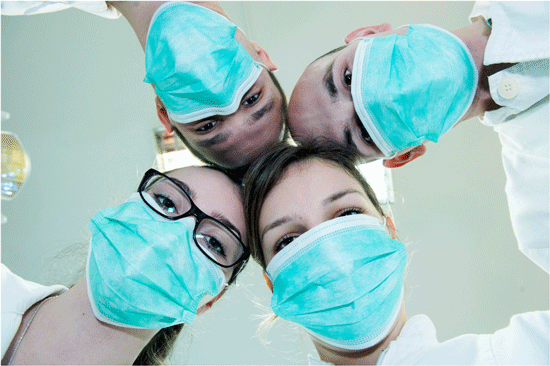
The integrated undergraduate and graduate university study enables students to gain knowledge and skills needed to become doctors of dental medicine. Its main goal is to provide the necessary knowledge from biology, preclinical, clinical medical and dental subjects. During the integrated six-year study program, students should obtain 360 ECTS credits, the total teaching schedule amounts to 5115 hours of classes, students should attend 4565 obligatory teaching hours and have 550 hours of elective courses at their disposal but selected in such a way to obtain 60 ECTS credits per year. Students attend 1001 hours of preclinical and 2099 hours of clinical practicals, 2000 hours of lectures and seminars carried out within 59 obligatory and 30 elective courses and attend 71 exams.
The courses are divided into four basic groups: basic courses, preclinical courses, general medical courses and dental courses. Basic courses amount to 805 teaching hours (16% of the total hours). General medical courses amount to 1015 hours (20%) whereas the greatest number of teaching hours belong to the dental group of courses– 3295 hours (64%).
In this way, the students are able to obtain the basic knowledge and are introduced to general medical courses with the focus on dental courses and many hours of practicals. The additional 500 hours of practicals have been introduced to the 6th year of study since the formerly obligatory foundation year has been abolished in 2015.
Doctors of dental medicine can continue their education by enrolling into postgraduate study programs, either doctoral or specialist studies.
The integrated university study program has proven to be optimal in reaching the educational goals. The study program is organized in Croatian language for up to 90 students, with the planned student quota of 85 Croatian and EU students and 5 non-EU students. Starting with the year 2017, we are enrolling up to 20 students in the study program fully taught in English.
Biomedicine, and thereby dental medicine as its integral part, requires a wide spectrum of knowledge and skills from basic sciences, preclinical sciences, medical subjects, dental subjects as well as social sciences, which cannot be covered by a two-segment study.
Dental medicine is more than just a skill; it is a combination of medical doctrine and art. These skills can only be acquired gradually but only when combined they make a competent doctor of dental medicine. Principles of the profession have to be respected and the relevance of integrated, comprehensive patient care should be prioritized.